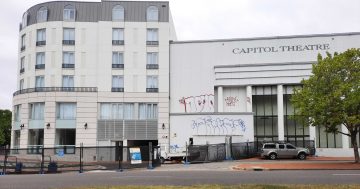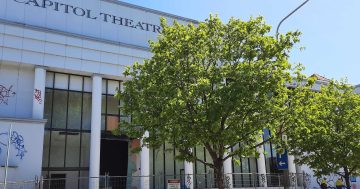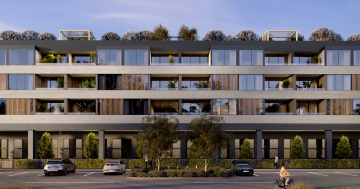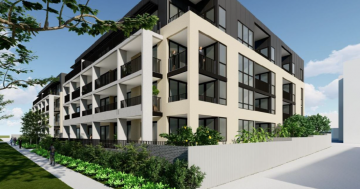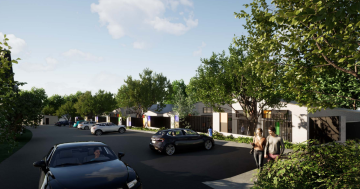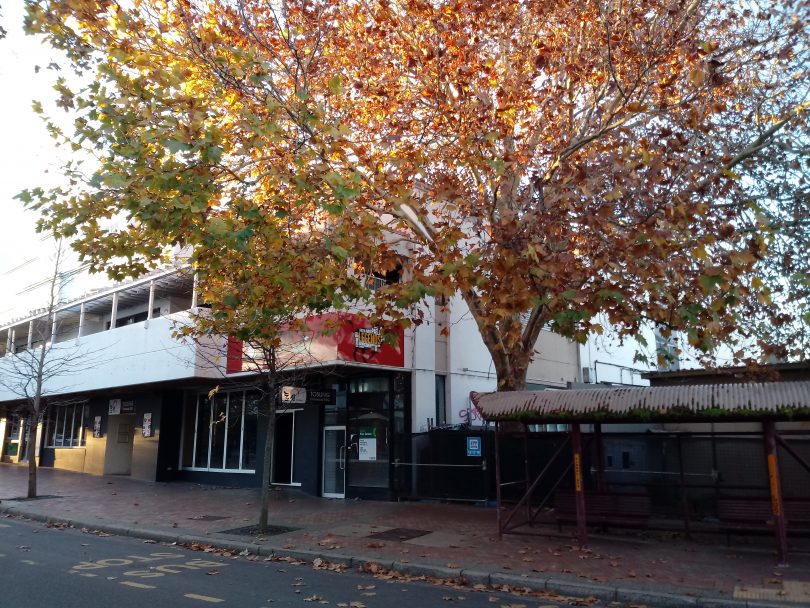
Going: the large London Plane tree on Franklin Street in question. Photos: Ian Bushnell.
Construction of the first stage of the Manuka hotel development could be under way by Christmas after the large London plane tree blocking the project lost its protected status.
In a mediation hearing in the ACT Civil and Administrative Tribunal on Friday between the Liangis family and the Conservator of Flora and Fauna, who had refused the family’s application to have the tree removed from the ACT tree register, it was agreed the tree could go if the family supported local Landcare groups and included a ‘green’ wall in the hotel project.
The Liangis had gone to ACAT to challenge Conservator Ian Walker’s decision in May to uphold the protected status of the tree, which had grown up between the Capitol Theatre building and another on Section 96.
“While I understand that members of the community will be unhappy with the loss of this special tree, a consideration of all latest information indicated the removal of protected status for the tree was appropriate,” Acting Conservator Gene McGlynn said.
He said the mediated outcome would see a 15-metre tall green wall added to the development that would ensure a visible bit of living vegetation to the top of the new building, as well as support for flora in the region.
The process for nomination and assessment of trees remained unchanged.
John Liangis said it was a rational and amicable decision to remove the tree, and he hoped it meant that more scrutiny would be applied when trees were nominated for the register.
“When people nominate trees there’s got to be more of an investigation into the ramifications of actually registering the tree,” he said.
They should have to meet the register’s stringent criteria and be in a proper location suitable for their species.
But he didn’t believe the decision would be detrimental to other registered trees because not many were in the situation this tree was in.

The base of the Manuka tree between the buildings.
Mr Liangis said the decision and the development’s go ahead would usher in a new dawn for Manuka.
“It provides an opportunity to redevelop the entire Section 96, and we aim to provide a hotel, with a cinema component, and ground floor commercial,” he said.
“It’s going to make a huge difference to Manuka, and there’s a lot of things happening around Manuka. Stuart Flats are going to be developed, density is going to be increased. It’s going to really create a renaissance in the area.”
The decision would also get the ball rolling on Stage 2, which was in at the preliminary design phase. Stage 1 could be complete by early 2021.
Griffith Narrabundah Community Association president Leo Dobes said the outcome was not unexpected but still disappointing, particularly as the Association was not allowed to join the mediation due to various procedural reasons.
“There’s always going to be some tendency to move things the way the developer wants and it’s happened again,” he said.
He believed there was something wrong with ACAT, as the Kingston Barton Residents Group had had similar experiences with the Tribunal.

A drawing of the proposed hotel development, designed by Cox Architecture.
He said the development could have accommodated the tree, as the Aubergine Restaurant building at Griffith shops had done with a large tree only a metre away.
“It was a very similar case there. The community objected to it being chopped down and the developer then found a way to build right up near the tree.
“It’s becoming the norm, you can build next to a tree providing you’ve got a good architect, and that could have been done in this case. But it wasn’t considered,” he said.
The Liangis family argued that the location of the tree meant it was impossible to include in the design.
The Inner-South Business Council said the outcome was a victory for the Manuka Group Centre, local businesses, residents, and the local hotel and hospitality industry.
“This project will go a long way in further developing the character of the Manuka Group Centre. It will expand the customer base for local businesses, create jobs, and help to revitalise Manuka back to its former glory,” said chair John-Paul Romano.
“This outcome means more customers for Manuka businesses; it means that empty commercial spaces will be filled, and that the area will become more vibrant and its character will further develop.”












